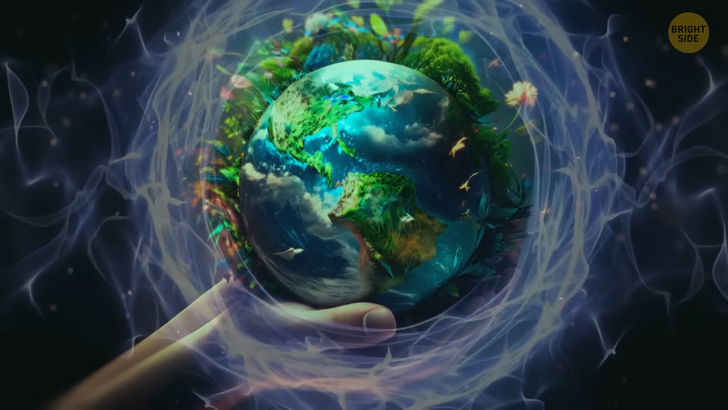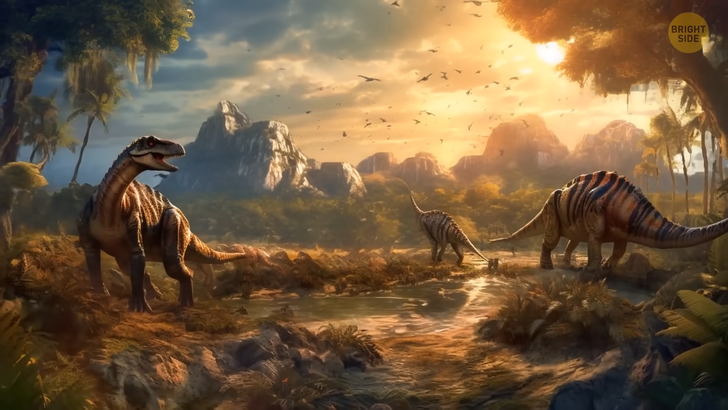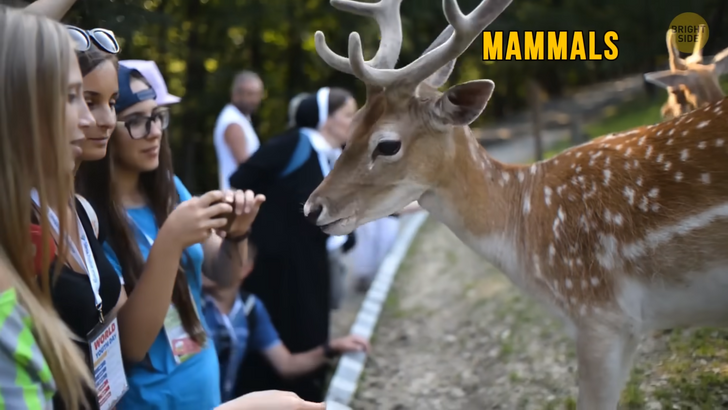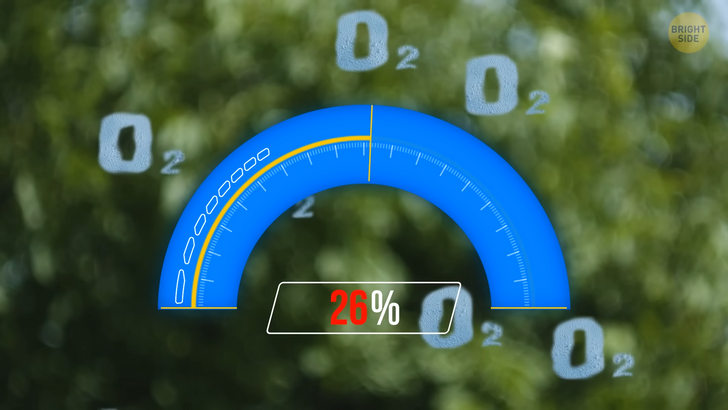Helen Hunt, 60, Stuns During Her Latest Appearance, and Her Lips Become the Center of Attention

Imagine a planet where every breath you take electrifies your body like a shot of espresso. The sky above you is an intense shade of blue, while colossal trees stretch towards the heavens, their vibrant green leaves growing at an astonishing rate. Daily exercise becomes a thrill like no other.
With the abundance of oxygen, you become a supercharged version of yourself. Running feels effortless as you dart across the landscape, lifting weights that would normally seem impossible. It’s as if the world itself is infused with a surge of energy. Everything is moving faster.

The wildlife surrounding you is equally affected by this oxygen overload. Animals roam the land in majestic proportions. Their massive frames are propelled by speed and agility. Picture yourself in a pulse-pounding chase with an oxygen-charged cheetah, racing against a predator that could put a Ferrari to shame.
Now, you may wonder how such a wild scenario could ever be possible. Well, let’s see. Oxygen is the powerful fuel that keeps life going. It makes up about 21% of the air we breathe, and every breath we take delivers these tiny molecules to our cells, giving them the energy they need to thrive. Without oxygen, our cells would struggle, and our bodies would fall apart. But that’s not all.
Oxygen is a superstar that works for all kinds of living things, from tiny bacteria to giant elephants. It’s even important underwater, where it enriches the oceans. Amazing creatures like plankton and algae produce lots of oxygen, creating a thriving underwater world. But to fully understand the impact of high oxygen levels on the planet, prepare for a journey back in time.
Recently, scientists have made an astonishing discovery. They tested rocks from two different places that were really far apart. And can you believe it? These rocks held tiny pockets of gas that showed how oxygen levels shot up by almost a third in a very short time. It was like a breath of fresh air! So, they studied these rocks and found that oxygen levels back then were much higher. Imagine lush landscapes, towering forests, and gigantic swamps that stretched as far as you could see.

During the Carboniferous Period, oxygen ruled the atmosphere at an impressive 20%, just like today. But over the next 50 million years, its levels shot up to a crazy 35%! Can you imagine what that did? As oxygen surged, something incredible happened. Huge forests grew all over the land, creating a breathtaking green world. And massive swamps took over low-lying areas, making the landscape look surreal and otherworldly.
At the same time, carbon dioxide levels dropped. Normally, when things break down, microbes release carbon dioxide into the air. This gas acts like a warm blanket, trapping the Sun’s heat and raising temperatures. But in the mysterious swamps where these giant plants were buried, the microbes couldn’t do their job.
The result? The planet got really cold. Who would have thought that a breath of fresh air could have such power? The scientists are still trying to figure out why this happened, but one thing is certain — it wasn’t just happening in one place.
It was a worldwide phenomenon! It was like the planet was playing a funny game with the climate. But let’s go even earlier. We see the first North American dinosaurs making their grand entrance. High oxygen levels are what gave a big boost to the rise of mighty dinosaurs in North America and beyond!

Picture tropics filled with the magnificent, giant creatures. Obviously, dinosaurs didn’t just appear out of nowhere. They took advantage of a changing environment that was perfect for their evolution. Oxygen levels played a huge part in this dinosaur party.
As oxygen levels rose, so did the size of these incredible creatures. They started small with predators like Chindesaurus, and soon after, huge dinosaurs like sauropods took over the land. Then, 65 million years ago, dinosaurs disappeared and mammals took over. And here’s the interesting part: mammals never grew as big as dinosaurs. So what’s the explanation for this?
Mammals — and humans are mammals too, by the way — are special because we can regulate our body temperature. But that comes at a cost. We need a lot of energy to stay warm compared to reptiles and dinosaurs. Dinosaurs didn’t bother with temperature control, so they could focus on growing big. The biggest dinosaurs were ten times larger than the largest mammals.
It’s like a game of “anything you can do, I can do ten times bigger!” Dinosaurs might have had similar limitations with their sizes, but those were much less strict. Before the dinosaurs’ extinction, mammals were very small. Many mammal species disappeared along with the dinosaurs. But survivors took advantage of the open ecosystem and rapidly diversified into various body sizes.

However, after 42 million years of growth, mammals reached a size plateau. This happened on all continents. Most likely, because of the temperature and land area. Colder environments allowed mammals to grow larger. Balancing body size and heat became challenging.
Land area also played a role in sustaining big populations. But making animals bigger isn’t the only thing high oxygen can do. This humble gas is a true jack-of-all-trades. It also acts as our loyal bodyguard, protecting us from harmful UV rays and other dangers from space. Without oxygen, we would be defenseless against space threats.
Oxygen also has a fascinating role in shaping the weather. It teams up with its other atmospheric buddies to make the sky go wild with tornadoes, hurricanes, and thunderstorms. They mix and mingle in the air, creating just the right conditions for these exciting weather adventures to happen. And these adventures can be dangerous, but they serve an important purpose. They help distribute nutrients and organic matter, carrying soil, leaves, and debris to new places.

So what if we decided to mess with nature and crank up the oxygen levels to crazy heights — 30%, 40%, or even 50%? Well, too much of a good thing can become dangerous. Oxygen toxicity is when too much of this gas causes big problems. It’s like eating loads of candy — it’s fun at first, but soon enough, you’ll regret it. Surprisingly, an overdose of oxygen can leave you struggling for breath, like a tired dancer in desperate need of a break. At first, you might feel a burst of energy, but it doesn’t last.
Dizziness sets in, as if you’ve been spinning on the dance floor for hours without stopping. In extreme cases, too much oxygen can even harm your body, making you feel like you’ve crashed into a huge truck. So, while oxygen is always with us, giving us life, it’s important to appreciate its delicate balance. Don’t put on your special breathing gear!
Also, we wouldn’t be the only creatures to suffer from this oxygen extravaganza. Mammals, for example, will struggle to adapt to these extreme levels. The balance of power among species will change drastically, and winners and losers will fight for survival in a world that’s spinning out of control. And we’ll need stronger shelters to deal with these gigantic animals. We’ll have to stay nimble and avoid danger.
Amidst all the chaos, there will be astonishing adaptations. Birds will fly higher than ever before, reaching heights that would amaze even the clouds. Also, get ready for more natural disasters and delicate ecosystems hanging in the balance. Fires will start quickly and rage fiercely, making wildfires a constant threat. Even a small spark from a campfire could cause disaster. We’ll need to rethink our cooking and heating methods to stay safe in this oxygen-filled world.

But let’s not forget the other side of the oxygen story. If we had a planet with low oxygen — only around 15% — we would face a completely different struggle. Every breath would be difficult, leaving us tired and struggling for air.
Physical activity would become extremely hard, and our memory and focus would suffer. So let’s be grateful for the oxygen levels we have now — they’re the perfect balance for us to thrive.
In this exhilarating journey through an oxygen-rich world, we’ve experienced breathtaking wonders and discovered the delicate balance of our planet. Let’s cherish the magic in every breath, respect the interplay of oxygen and life, and embrace the thrill of this remarkable ride called life!











